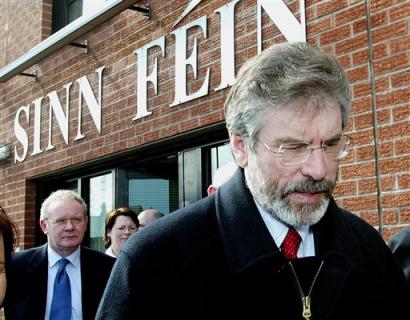
Hard Sums
Sinn Féin ponders what it may be like to play kingmaker in Ireland.
by Patrick Belton
05/24/2007 10:00:00 AM
Dublin
IN A CITY where cranes dot every stretch of the horizon, Gerry Adams, the president of Ireland's Sinn Féin party, and I passed the day before elections in two working-class Northside neighborhoods, not all of whose inhabitants have been touched by Ireland's vaunted "Celtic Tiger" economic resurgence.
We go to the city center, where Sinn Féin's national chairwoman, Mary Lou McDonald, is running for a seat in Dublin Central and later to Finglas, where IRA bomb maker-turned-councilor Dessie Ellis is seeking a seat in Dublin North-West.
This is Sinn Féin's moment: The party hopes to add between five and seven parliament seats to its current set of five; it is projected to poll 10 percent in today's elections, up from 7 percent in 2002 and 3 percent in 1997. With the governing Fianna Fáil-Progressive Democrats coalition locked in close war with the alternative Fine Gael-Labour-Green alliance and neither tipped to command a majority, Sinn Féin could end up as Ireland's kingmaker.
Sinn Féin seems eager to cover up its bullet holes. But still the question remains: Why are so many people in a peaceful nation enjoying the strongest economic growth of the E.U.-15, disposed to vote now for a party headed by a former member of the IRA's Army Council and a socialist? The answer lies partly in cultural dislocations caused by the Irish economy (where low taxes fuelled an average annual GDP growth of 7 percent over the last decade), and partly in concern for how this wealth is being spent--not to mention the issue of those feeling left behind in all of this growth.
With its message of social leveling, Sinn Féin's gains have been strongest amongst members of the working classes unmoved by the recent high tide. Sinn Féin is the only party whose platform calls for redistribution of wealth through higher taxes.
There is also the benefit of Sinn Féin's ambiguity. There's little in their platform that they have not been willing to pull back from when pushed. A touch of inscrutability has its privileges, and in some polls, Adams has the highest favorable ratings of any Irish politician. So many voters from across the political continuum have flirted with Adams.
Yet 90 percent of Irish voters are not republicans, not of Gerry Adams's sort anyway. They have at least two good reasons not to be. First, there is the terrorism. The Good Friday Accords were signed in 1998; the Colombia Three were arrested in 2001 for offering bomb-making and urban warfare expertise to the narco-trafficking FARC in return for €25 million. Each of them had Sinn Féin as well as IRA connections: Niall Connolly was the Latin American representative for the party and had been arranging Gerry Adam's visit to Havana; Martin McCauley was an election worker in the Upper Bann constituency in 1998, and James Monaghan was voted to the party's Ard Chomhairle in 1989. (It's a bit rich that the party's platform now promises a crackdown on drugs.) Second, Sinn Féin has not taken the socialism out of (their) Irish politics. Their platform likes high corporate and individual taxes, the opposite of the growth recipe used by the ruling Fianna Fáil party for the last decade.
I ASKED ADAMS if he was concerned that his party's call for more spending on social services would kill the Celtic Tiger. He countered that no voters with whom he'd spoken had shared that concern, that they were pressed down by overly expensive housing and an inadequately managed healthcare system. He also pointed to the €5.6 billion budget surplus, evidence that taxes needn't be raised and that the government was not adequately supporting the poor.
When asked what would need to happen for Sinn Féin to join the Fianna Fáil coalition Adams says that his party will not be easily lured and that there would need to be agreed upon joint steps both towards United Ireland and expanded social protection--particularly when it comes to Ireland's housing woes.
It's easy to see why people like the ursine Adams--and his public-services orientated and post-Troubles successor McDonald, and the personable, easy-going Daithí Doolan. Compared with the calculated slickness that surrounds Fianna Fáil, Sinn Féin's leadership is aesthetically appealing. (During one public appearance yesterday, Ireland's current taoiseach (prime minister) was paraded mutely before the cameras on a bridge by the Irish Financial Services Centre. It had all the subtlety and warmth of a Ryanair ad.) But while Sinn Féin's republicanism can be attractive, it would almost certainly also be an express ticket to banana status for this Republic.
So going forward, the issue is one of coalition arithmetic. If the Dáil (parliament) is hung, protracted negotiations will likely precede the formation of a government. And the current taoiseach, Bertie Ahern, faces hard sums. Though he and opposition leader Enda Kenny of Fine Gael have both forsworn Sinn Féin as a coalition partner, vows, like rules, are made to broken. Ahern has already cracked the door by stating that he couldn't stop Sinn Féin deputies from voting to prop up the government if they so chose. With its smaller number of seats, Sinn Féin would require fewer portfolios than would a coalition with Labour. The question then becomes, How much sway would Sinn Féin exert as a junior partner?
Patrick Belton is a London-based journalist, completing a doctorate at Oxford.
© Copyright 2007, News Corporation, Weekly Standard, All Rights Reserved.
No comments:
Post a Comment